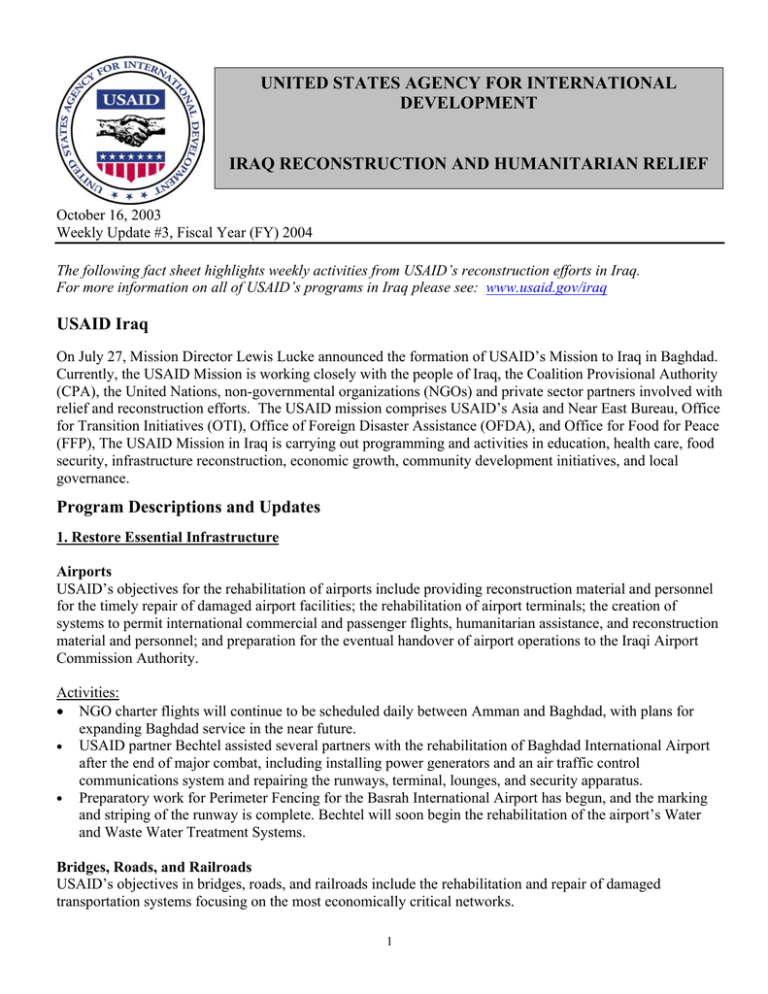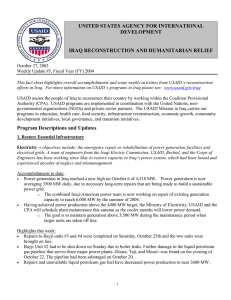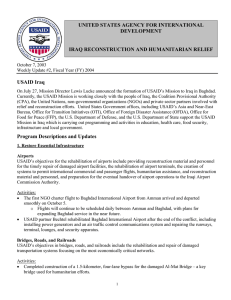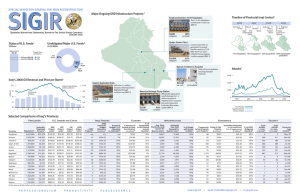UNITED STATES AGENCY FOR INTERNATIONAL DEVELOPMENT IRAQ RECONSTRUCTION AND HUMANITARIAN RELIEF
advertisement

UNITED STATES AGENCY FOR INTERNATIONAL DEVELOPMENT IRAQ RECONSTRUCTION AND HUMANITARIAN RELIEF October 16, 2003 Weekly Update #3, Fiscal Year (FY) 2004 The following fact sheet highlights weekly activities from USAID’s reconstruction efforts in Iraq. For more information on all of USAID’s programs in Iraq please see: www.usaid.gov/iraq USAID Iraq On July 27, Mission Director Lewis Lucke announced the formation of USAID’s Mission to Iraq in Baghdad. Currently, the USAID Mission is working closely with the people of Iraq, the Coalition Provisional Authority (CPA), the United Nations, non-governmental organizations (NGOs) and private sector partners involved with relief and reconstruction efforts. The USAID mission comprises USAID’s Asia and Near East Bureau, Office for Transition Initiatives (OTI), Office of Foreign Disaster Assistance (OFDA), and Office for Food for Peace (FFP), The USAID Mission in Iraq is carrying out programming and activities in education, health care, food security, infrastructure reconstruction, economic growth, community development initiatives, and local governance. Program Descriptions and Updates 1. Restore Essential Infrastructure Airports USAID’s objectives for the rehabilitation of airports include providing reconstruction material and personnel for the timely repair of damaged airport facilities; the rehabilitation of airport terminals; the creation of systems to permit international commercial and passenger flights, humanitarian assistance, and reconstruction material and personnel; and preparation for the eventual handover of airport operations to the Iraqi Airport Commission Authority. Activities: • NGO charter flights will continue to be scheduled daily between Amman and Baghdad, with plans for expanding Baghdad service in the near future. • USAID partner Bechtel assisted several partners with the rehabilitation of Baghdad International Airport after the end of major combat, including installing power generators and an air traffic control communications system and repairing the runways, terminal, lounges, and security apparatus. • Preparatory work for Perimeter Fencing for the Basrah International Airport has begun, and the marking and striping of the runway is complete. Bechtel will soon begin the rehabilitation of the airport’s Water and Waste Water Treatment Systems. Bridges, Roads, and Railroads USAID’s objectives in bridges, roads, and railroads include the rehabilitation and repair of damaged transportation systems focusing on the most economically critical networks. 1 Activities: • Completed construction of a 1.5-kilometer, four-lane bypass for the damaged Al-Mat Bridge – a key bridge used for humanitarian efforts. • Completed 36 detailed bridge assessments and, based on the assessments, initiated work in cooperation with the Iraqi Ministry of Public Works to rehabilitate three priority bridges: Al Mat, Khazir, and Tikrit bridges. Electricity USAID’s objectives for the rehabilitation of electricity include the emergency repair or rehabilitation of power generation facilities and electrical grids. The goal was to restore Iraqi power generation to 4,400 MW a day by October 2003 and provide reliable power to at least 75 percent of Iraqis by 2004. Activities: A team of engineers from the Iraqi Electric Commission, USAID, Bechtel, and the U.S. military has been working since May to restore capacity to Iraq’s power system, which had been looted and experienced decades of neglect and mismanagement. • Power generation in Iraq reached a new high on October 6 of 4,518 MW. Since October 1, the CPA Power Team achieved generation output above 4,000 MW on all but two days. o The combined Iraqi-American power team is now working on repair of existing generation capacity to reach 6,000 MW by the summer of 2004. • Seaport USAID’s objectives for the rehabilitation of the Umm Qasr port include developing improvement plans to overcome constraints, hiring of port pilots to guide ships up the channel, coordinating onward transport from the seaport, and facilitating cargo-handling services such as warehousing, shipment tracking, and storage. Activities: • Two additional Iraqi dredges are being refurbished, which are assigned to routinely clear accumulating silt from Umm Qasr port. • Sheikh Hassan guards, who had previously quit due to lack of pay from the Port authority, returned to the port as official Iraq Port authority employees. • At the Umm Qasr grain-receiving facility, train load-out systems are complete, and work continued on the administration building and fire water systems. All other systems are operational. • All the power substations at Umm Qasr’s new port are energized and the entire port is now lit at night. Some electrical fixtures on the towers are being replaced. Telecommunications USAID’s objectives for telecommunications in Iraq include linking 21 cities by fiber optic cable and preparing one million wired lines to be operational; repairing the nation’s fiber optic network from north of Mosul, through Baghdad and Nasiriyah to Umm Qasr by November 2003; and repairing the 2,000 km cable to connect 20 cities to Baghdad and benefit 70 percent of Iraq’s population. Activities: • The rehabilitation of Iraq’s public switched telephone network continues, coordinated by the Iraqi Telephone and Postal Commission and Bechtel. • Work is underway at eight of the twelve switch sites--Sinek, Bab Almuadham, Alwiya, Adamiyah, Baya, Abu Ghraib, Samarra, and Salihiya. Splicing and cable testing is complete at Al Mamoun, Kadamiyah, Baya, Abu Ghraib, and Samarra. 2 • In Baghdad, three of the twelve replacement telephone exchange switches are being tested and will benefit 30,000 subscribers by the end of October. 2. Support Essential Health and Education Health USAID’s objectives for health in Iraq include supporting a reformed Iraqi Ministry of Health; delivering essential health services; funding medicines and micronutrients; establishing a rapid referral and response system for the most serious cases; providing medical equipment and supplies; training and recruiting health staff; providing health education and information; and determining the specific needs of the health sector and of vulnerable populations such as women and children. Activities: • To date, over 30 million doses of vaccines have been procured and distributed by the Ministry of Health (MOH) since July, supported by USAID and UNICEF. • An estimated 3 million Iraqi children under the age of 5 have been vaccinated. • Rehabilitated 20 delivery rooms in hospitals and primary health care centers serving 300,000 residents in Basrah. • More than 100,000 pregnant, nursing mothers and malnourished children under 5 years have received 2.5 kg of high protein biscuit supplementary food rations. • The first batch of 74 “health clinic in a box” kits arrived at the Department of Health in Basrah on October 9th. The kits supply basic medical instruments and supplies for a primary health clinic. The Director General of Health is working with USAID partner Abt Associates on a plan to distribute the kits. • A generator was delivered to the Al Hillah oxygen plant this week that will supply medical grade oxygen to hospitals and primary clinics in AL Hillah and 4 provinces. • A maternal health seminar in Tikrit (Salah ad Din Governorate) was attended by 50 women this week. The seminar is one of the first USAID reconstruction activities to take place in Tikrit. Education USAID’s objectives in education for Iraq include increasing enrollment and improving the quality of primary and secondary education, ensuring that classrooms have sufficient materials for the start of the new school year in October, facilitating community involvement, training teachers, implementing accelerated learning programs, and establishing partnerships between U.S. and Iraqi colleges and universities. Schools throughout Iraq successfully reopened the first week in October. Activities: • To date, 1,595 schools have been rehabilitated/repaired for the start of the school year the first week in October. Additional rehabilitation of at least 200 schools is ongoing. • To date, 60% of school furniture, 33% of the chalkboards, 50% of secondary school student kits, and 50% of primary school student kits have been delivered. • Student attendance at ten randomly selected schools shows that as of October 5, 96 percent of registered girls and 92 percent of registered boys were present. Attendance will continue to be monitored over the next month, with a focus on discerning any gender disparities. • The Ministry of Education’s Accelerated Learning Program is establishing pilot projects in five cities to speed up the learning process for children that have been out of school. To date, 46 of 60 teachers have been recruited, and 500 students have registered for 650 slots. The Accelerated Learning Program is being initiated in Baghdad, Karbala, Arbil, Ad Diwaniyah, An Nasiriyah. 3 Water and Sanitation USAID’s objectives in water and sanitation include rehabilitating and repairing essential water infrastructure to provide potable water and sanitation to communities and improve irrigation. Activities: • The Safwan potable water pump station of Khor az Zubayr (Basrah Governorate) is almost complete and will re-establish piped water to Safwan, benefiting 40,000 people. • Hundreds of Iraqis and the Civil Affairs Battalion will begin a massive clean-up next week of Al Karkh Baladiya neighborhood in Baghdad, which was neglected by the previous regime. Improved drinking water is being supplied to 470,000 residents of Kirkuk (At’ Tamim Governorate) and to 280,000 residents in Al Kut (Wasit Governorate). • A five-week community sanitation workshop for children is being conducted in two of Al Basrah’s leastserved areas--Al Hayanniya and Al Jummoriyah. • A 250-kV generator for a sewage treatment plant in Al Hayy (Wasit Governorate) was delivered over the weekend under a $43,000 grant implemented by Development Alternatives, Inc. The city sewer system had been able to operate only ten hours a day, but the new generator will allow it to operate continuously. • Bechtel continues to clean the terminal reservoir of the Sweet Water Canal that provides drinking water for Basrah City. When that portion of the reservoir is completed, the cleaned area will be filled with water to supply a water treatment plant. The other half of the storage area will then be drained and cleaned. Food Security USAID’s objectives in food security include providing oversight support for the country-wide Public Distribution System (PDS) which provides basic food and non-food commodities to approximately 26 million people; participating in the design of a monetary assistance program to replace the commodity-based PDS in order to support local production and free-market infrastructure, and promoting comprehensive agriculture reform to optimize private participation in production and wholesale markets. Activities: • Technical assistance to CPA authorities in Erbil and Baghdad during Oil for Food transition. • Ongoing funding to the UN/World Food Program which has managed the PDS since May, and is currently working with its Iraqi counterparts in the Ministry of Trade and the Kurdish Food Department to ensure the smooth transition of PDS management over to those organizations. • Renovation/refurbishment of governorate warehouses and PDS management centers (e.g. Basra, Wasit, Thi Qar). • Training and capacity building activities conducted by the Food Department and the World Food Program in the northern governorates are better equipping the Food Department to assume the management of the public distribution system. 3. Expand Economic Opportunity Economic Governance USAID’s objectives for economic governance currently include 17 priority areas approved by the CPA that are in various stages of initial implementation. Objectives address currency conversion and monetary data, state-owned enterprises, small businesses credits, commercial legislation, a national employment program, a bank-to-bank payment system, a financial management information system, tax policy and administration, budget planning, insurance, and electricity reform. 4 Activities: • On October 15, the Central Bank of Iraq began accepting currency issued since 1957, allowing banks throughout the country to exchange old currency for new. • Since September, the Central Bank has reduced the amount of old currency in circulation by roughly one third from approximately 3.4 trillion to 2.3 trillion Iraqi Dinars. • This week, in Wasit Governorate, USAID partner Mercy Corps is increasing employment for women by providing 150 sewing machines to employ 700 women by the end of October and holding an industrial sewing workshop with a women’s association in Numanya. 4. Improve Efficiency and Accountability of Government Local Government USAID’s objectives in local government include the promotion of diverse and representative citizen participation within and among communities throughout Iraq. Activities focus on strengthening the management skills and capacity of local administrations, local interim representative bodies, and civic institutions to improve the delivery of essential municipal services such as water, health, public sanitation and economic development, and conducting training programs in communications, conflict resolution and leadership skills. Activities: • Research Triangle Institute is working in 16 governorates where more than 15 million Iraqis are engaging in local policy discourse, either directly or through their representatives. • The number of Iraqi NGOs is increasing. More than 200 people representing 83 Iraqi organizations attended the weekly NGO Coordination Meeting in Baghdad this week. • Local leaders and academics in Al Anbar Governorate, specifically Ar Ramadi and Al Fallujah, have begun to identify potential program activities for USAID’s Local Governance Program. • Over 200 people from 83 different Iraqi organizations attended this week’s NGO Coordination Meeting to participate in workshops on strengthening civil society. • Men and women from all over Iraq are participating in unprecedented democracy workshops in the Ba’Quba and Al Hillah Governorates, creating a more dynamic civil society. • The Kirkuk Governorate Council’s Education Committee selected a chairperson, based on qualification, on October 9th. Community Action Program USAID’s goals with the Community Action Program (CAP) include the promotion of diverse and representative citizen participation in and among communities throughout Iraq to assist in the identification, prioritization, and delivery of critical community needs. CAP is implemented by five U.S. NGOs with established offices in nine major Iraqi cities located throughout the country. Activities: • Community associations in Baghdad have completed 42 small projects in Baghdad, with 72 more underway. • Community Associations in Sadr City (Baghdad) are rehabilitating the Ram Alah School, benefiting 1,250 students, and reopening the children’s ward of Al Qadisiyah Hospital. • ACDI/VOCA, a Community Action Partner, is expanding geographic coverage throughout Northern Iraq with projects in education, agriculture, and infrastructure including school and hospital rehabilitation. Transition Initiatives 5 USAID’s Office of Transition Initiatives (OTI) provides fast flexible assistance to meet Iraq’s most critical challenges in the current transition phase. USAID/OTI identifies and fills crucial gaps in U.S. Government assistance with the purpose of giving local populations a growing sense of empowerment and providing quick, tangible improvements in the daily lives of Iraqis. Activities are primarily implemented by Development Alternatives, Inc. (DAI) and the International Organization for Migration (IOM). Activities: • During September, 102 grants worth $9,273,915 were awarded by OTI, including 74 grants for community impact activities, 15 grants for justice and human rights activities, 7 grants for civil society organizations, and 6 grants for transparency and good governance activities. • To date, 60 ministries, municipalities and government commissions have received essential supplies and equipment for a total of $6,717,000 in grants. • The Women’s Association of Babil, the Iraq Foundation, and Women for a Free Iraq organized a Heartland of Iraq Women’s Conference October 4-7 at the University of Babil in Al Hillah, supported by a small grant from DAI. The conference addressed issues pertaining to Islam and democracy, women’s rights, free elections, and forming a constitution. 6 Implementing Partner Agency Sector Regions Amount FY 2003 EMERGENCY RELIEF USAID/OFDA ........................................................................................................................................... $87,112,161 Administrative Administrative Costs Countrywide $5,064,167 AirServ Logistics Countrywide $14,338,845 ARC Capacity building, Disaster support Al Basrah $537,746 The Cuny Center Research studies Countrywide $40,260 GOAL Coordination, Nutrition Al Muthanna’ $1,507,900 International Health Countrywide $1,283,772 Dispensary Association InterAction Coordination Kuwait City $92,860 IOM IDP programs Countrywide $5,000,000 IMC Capacity building Countrywide $202,900 Logistics Commodities and DART support Countrywide $10,966,351 SCF/US NGO Consortium Countrywide $883,131 UNICEF Health, nutrition, water/sanitation Countrywide $4,000,000 UN OCHA Coordination and Information Countrywide $1,200,000 WFP Logistics and pre-positioning of food Countrywide $5,000,000 Cooperative Agreements IMC $8,000,000 Quick-impact projects: Food Security, Countrywide Health, Nutrition, Water/Sanitation Health Al Basrah, Maysan, Wasit, Kirkuk, At’ Tamin Health, Water/Sanitation An Nasiriyah IRC $4,998,685 Quick-impact projects: Health, Countrywide Water/Sanitation Water/Sanitation Kirkuk, Karbala’, Najaf Quick-impact projects: Health, Non- Countrywide Mercy Corps $5,000,000 Food Items, Shelter, Water/Sanitation Water/Sanitation Kirkuk Water/Sanitation Diyala’, Al Kut, Khanaqin Water/Sanitation Wasit Water/Sanitation Al Basrah Quick-impact projects: Food Security, Countrywide SCF/US $6,000,000 Health, Shelter, Nutrition, Non-Food Items, Water/Sanitation Nutrition Mosul Health, Transportation Mosul Water/Sanitation Al Basrah Health Mosul Health Baghdad Nutrition Baghdad Water/Sanitation, Health Al Basrah IDP Support Al Basrah 7 World Vision CARE Quick-impact projects: Health, Logistics, Non-Food Items Water/Sanitation Hospital Rehabilitation Water/Sanitation Quick-impact projects Water System Rehabilitation Blankets, Hygiene Kits Countrywide Al Anbar Al Anbar Mosul Countrywide Al Anbar Baghdad $4,994,959 $8,000,000 USAID/FFP .............................................................................................................................................. $419,612,000 WFP Operations Countrywide $32,812,000 WFP Emerson Trust – 81,500 MT Countrywide $39,400,000 P.L. 480 Title II emergency food Countrywide $147,400,000 commodities – 163,820 MT WFP WFP Regional Purchase – 330,000 MT Countrywide $200,000,000 STATE/PRM.............................................................................................................................................. $38,935,691 UNHCR Emergency assistance Countrywide $21,000,000 ICRC Emergency assistance Countrywide $10,000,000 IFRC Emergency assistance Countrywide $3,000,000 IOM TCN – transportation assistance Countrywide $3,630,000 Lebanon and Jordan $1,305,691 International Catholic Humanitarian assistance to Iraqi Migration refugees Commission RECONSTRUCTION USAID/ANE ......................................................................................................................................... $1,530,128,000 Abt Associates Health Countrywide $20,995,000 AFCAP Logistics Countrywide $91,500,000 Army Corps of Architecture and Engineering Countrywide $10,000,000 Engineers services BearingPoint Economic Governance Countrywide $39,000,000 Bechtel Airports, buildings, emergency communications, power, railroads, roads and bridges, Umm Qasr seaport, water and sanitation Community Action Development in impoverished Program communities Countrywide $1,029,834,000 Countrywide $70,000,000 DAI IRG RTI CAII UNICEF UNICEF UNESCO Countrywide Countrywide Countrywide Countrywide Countrywide Countrywide Countrywide $4,000,000 $18,286,000 $104,611,000 $37,853,000 $28,000,000 $7,000,000 $10,000,000 Countrywide Umm Qasr Baghdad Al Basrah Mosul Countrywide $10,000,000 $14,319,000 $17,500,000 WHO SSA SkyLink Marshlands Reconstruction Support Local Governance Education Health, Water, and Sanitation Education Textbook Printing and Distribution: Math and Science Strengthen Health System Port Management Airport Management MSI Monitoring and Evaluation 8 $5,500,000 University Partners Consortium led by the Research Foundation of the State University of New York (SUNY) at Stony Brook which includes Columbia University, Boston University and Oxford University (England), University of Hawaii's College of Tropical Agriculture and Human Resources, and the Human Rights Institute of DePaul University College of Law (IHRLI) and the International Institute of Higher Studies in Criminal Sciences (ISISC) in Siracusa, Italy Baghdad University, Al Mustansiriyah University in Baghdad, Mosul University, Mosul University’s College of Agriculture and Forestry in Hamam al-Alil, and Basrah University $11,730,000 USAID/OTI……………………………………………………………………Subtotal: $56,664,190 Administrative Administrative Costs Countrywide $14,339,430 IOM Iraq Transition Initiative Countrywide $10,587,595 DAI Iraq Transition Initiative Countrywide $35,523,857 Internews Media Countrywide $160,359 Radio SAWA Media Countrywide $400,000 Spa War Inter-Ministry Communications Countrywide $8,703,001 TOTAL USAID ASSISTANCE TO IRAQ IN FY 2003.................................................................... $1,692,452,506 TOTAL STATE ASSISTANCE TO IRAQ IN FY 2003 ........................................................................ $38,935,691 Total STATE/USAID Assistance to Iraq in FY 2003 ........................................................................ $2,120,722,197 *Figures in funding sheet are subject to change and do not represent a final official accounting of USG obligations. 9










